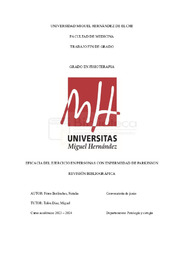Resumen :
Introducción: la enfermedad de Parkinson es una enfermedad neurológica degenerativa crónica progresiva común, caracterizada por síntomas motores que incluyen bradicinesia, rigidez, temblores, alteraciones posturales e inestabilidad. Así como síntomas no motores, como trastornos del sueño, depresión, ansiedad y dificultades cognitivas. Con respecto a las técnicas de fisioterapia, el ejercicio aeróbico o las modalidades de este, tienen por objeto retrasar la discapacidad motora y ofrecer beneficios personales y sociales.
Objetivos: la finalidad última de este trabajo es valorar la eficacia del ejercicio en personas con enfermedad de Parkinson.
Métodos: se llevó a cabo una búsqueda avanzada de artículos científicos en las bases de datos PubMed, PEDro, Enfispo, SciELO, Embase y EBSCOhost aplicando la ecuación de búsqueda: ((("parkinson"[Title/Abstract]) AND ("exercise"[Title/Abstract])) OR ("parkinson"[Title/Abstract])) AND ("physiotherapy"[Title/Abstract]).
Resultados: para la revisión bibliográfica se seleccionaron 10 ensayos clínicos aleatorizados que estudiaban el efecto del ejercicio en la población sujeta a estudio anteriormente descrita en relación con cuatro variables: marcha, equilibrio, función psicológica y calidad de vida.
Conclusión: la aplicación del ejercicio aeróbico u otra modalidad de este como técnica de tratamiento resulta eficaz para las personas con enfermedad de Parkinson sobre la marcha, equilibrio, función psicológica y calidad de vida, presentando una mínima controversia en las tres últimas variables mencionadas.
Introduction: Parkinson's disease is a common progressive chronic degenerative neurological disease, characterized by motor symptoms including bradykinesia, rigidity, tremors, postural disturbances, and instability. As well as non-motor symptoms, such as sleep disorders, depression, anxiety and cognitive difficulties. With regard to physiotherapy techniques, aerobic exercise or aerobic exercise modalities are intended to delay motor impairment and offer personal and social benefits.
Objectives: the ultimate purpose of this study is to assess the efficacy of exercise in people with Parkinson's disease.
Methods: an advanced search of scientific articles was carried out in the databases PubMed, PEDro, Enfispo, SciELO, Embase and EBSCOhost applying the search equation: ((("parkinson"[Title/Abstract]) AND ("exercise"[Title/Abstract])) OR ("parkinson"[Title/Abstract])) AND ("physiotherapy"[Title/Abstract]).
Results: for the literature review, 10 randomized clinical trials were selected that studied the effect of exercise on the study population described above in relation to four variables: gait, balance, psychological function and quality of life.
Conclusion: the application of aerobic exercise or another modality of it as a treatment technique is effective for people with Parkinson's disease in terms of gait, balance, psychological function and quality of life, presenting minimal controversy in the last three variables mentioned.
|
 La licencia se describe como: Atribución-NonComercial-NoDerivada 4.0 Internacional.
La licencia se describe como: Atribución-NonComercial-NoDerivada 4.0 Internacional.
.png)
